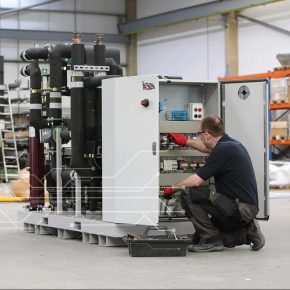
How Can I Retrofit Heat Pumps into my Commercial Property?
With the UK vying for net zero emissions, businesses are under increasing pressure to reduce their carbon footprint and boost energy efficiency. One practical solution that businesses can begin to explore is retrofitting heat pumps into their physical locations. These systems offer a greener alternative to traditional gas boilers, and can be integrated into existing buildings with ease.
In this guide, commercial heat pump manufacturers Clade Engineering dive into the details of retrofitting heat pumps in commercial settings, exploring everything you need to know to make an informed decision to get your business on track to reduce your impact on the environment.
What Is a Heat Pump Retrofit?
Put simply, retrofitting a heat pump involves upgrading or supplementing your current heating system with a heat pump. This can be done in most buildings, including commercial, residential, and industrial properties, with air source heat pumps being especially popular due to their lower costs and straightforward installation process.
Is My Building Suitable?
There are a number of factors to consider when deciding whether to retrofit a heat pump into a commercial building, and thankfully, the age of a building isn’t too much of an issue. Older buildings can definitely be retrofitted with heat pumps; the key is selecting the right type of heat pump and refrigerant that aligns with the building’s characteristics, and the owner’s goals.
When it comes to retrofitting, a building’s insulation is important; Good insulation that effectively reduces heat loss means only a smaller, more efficient heat pump would be needed. While heat pumps can be sized to meet any heat demand, a building with better insulation would result in lower operational costs of a heat pump system.

Depending on your current heating system, you might be able to reuse existing pipework. That being said, radiators might need resizing or replacing, particularly if the heat pump operates at lower temperatures than your old boiler system.
These are just a few of the considerations around building suitability, but it’s a good place to start when thinking about whether or not you can retrofit a heat pump.
The Installation Process
The retrofit process starts with a system designer conducting heat loss calculations to determine your building’s heating needs. They’ll then design a bespoke solution to meet these requirements with minimal disruption. Opting for a refrigerant with a temperature differential close to that of traditional boilers, like R290 (propane), can make the retrofit smoother.
Benefits of Retrofitting Heat Pumps
Efficiency and Cost Savings
Heat pumps are incredibly efficient, often achieving a Coefficient of Performance (COP) between 3 and 5. This means they can produce three to five times more heat than the electricity they consume. In contrast, gas boilers usually operate at around 80% efficiency.
Even though electricity is more expensive than gas, the efficiency of heat pumps can lead to significant savings on energy bills. You can further reduce costs by using renewable energy sources, like solar power, to run the heat pump.
Environmental Impact
Switching to a heat pump can drastically reduce your business’s carbon footprint. Even though much of the UK’s electricity still comes from fossil fuels, the growing share of renewable energy in the National Grid boosts the environmental benefits of heat pumps.
Choosing the right refrigerant is also an important step. Natural refrigerants like R290, for instance, don’t contribute to climate change, ozone depletion, or release harmful PFAS chemicals, making them an environmentally friendly option.
Longevity and Future-Proofing
Heat pumps typically last 15 to 20 years, outliving traditional boilers that usually last 10 to 15 years. Using natural refrigerants ensures compliance with future environmental regulations, protecting your investment from becoming obsolete due to regulatory changes.
Flexibility
Heat pumps are versatile. They can provide both heating and hot water and work well with various emitters at low surface temperatures, enhancing comfort and efficiency.
Conclusion
Retrofitting a heat pump offers a host of benefits for businesses, from increased efficiency and cost savings to environmental sustainability and future-proofing. The process can be straightforward, especially with the right system designer and refrigerant choice. With available financial assistance and the potential for significant long-term gains, retrofitting heat pumps is a smart investment for businesses looking to upgrade their heating systems, and a step in the right direction for the country’s goals to protect and preserve the environment.
Latest news

18th December 2024
BMBI: October Merchant sales rally with a +7.3% month-on-month increase
The latest Builders Merchant Building Index (BMBI) report shows builders’ merchants’ value sales in October were up +1.2% compared to the same month last year.
Posted in Articles, Bathrooms & Toilets, Bricks & Blocks, Building Associations & Institutes, Building Industry News, Building Products & Structures, Building Services, Building Systems, Civil Engineering, Cladding, Concrete, Cement, Admixtures, Drainage, Drainage Services, Floors, Garden, Hand Tools, Hard Landscaping & Walkways, Health & Safety, Heating Systems, Controls and Management, Heating, Ventilation and Air Conditioning - HVAC, Information Technology, Interior Design & Construction, Interiors, Landscaping, news, Paints, Paints, Coatings & Finishes, Pipes, Pipes & Fittings, Plant, Equipment and Hire, Plumbing, Power Tools, Publications, Research & Materials Testing, Restoration & Refurbishment, Retrofit & Renovation, Site Preparation, Sustainability & Energy Efficiency, Timber Buildings and Timber Products, Walls, Waste Management & Recycling
18th December 2024
GEZE UK announce Kids' Village charity partnership
Kids’ Village is delighted to have partnered with GEZE UK as their 2025 charity of the year – find out more via the article…
Posted in Access Control & Door Entry Systems, Architectural Ironmongery, Articles, Building Industry Events, Building Industry News, Building Products & Structures, Building Services, Charity work, Doors, Facility Management & Building Services, Health & Safety, Restoration & Refurbishment, Retrofit & Renovation, Security and Fire Protection, Windows
18th December 2024
Encon Achieves 5% Club Silver Membership
The Encon Group, the leading independent distributor of building materials, is pleased to announce that it has been awarded Silver membership of The 5% Club by the 2024/25 Employer Audit Scheme.
Posted in Articles, Awards, Bricks & Blocks, Building Associations & Institutes, Building Industry Events, Building Industry News, Building Products & Structures, Building Regulations & Accreditations, Building Services, Building Systems, Civil Engineering, Cladding, Concrete, Cement, Admixtures, Facades, Hard Landscaping & Walkways, Health & Safety, Insulation, Landscaping, Plant, Equipment and Hire, Recruitment, Restoration & Refurbishment, Retrofit & Renovation, Site Preparation, Training, Walls
18th December 2024
SWA: A focus on Steel Window Association member West Leigh
Located in Charlton, South London, SWA member West Leigh was established during the Blitz, in 1943. During the destruction in London, the company helped in repairing windows and facades that had been damaged by bombings throughout the city.
Posted in Articles, Building Associations & Institutes, Building Industry News, Building Products & Structures, Building Services, Building Systems, Case Studies, Facades, Glass, Glazing, Restoration & Refurbishment, Retrofit & Renovation, Steel and Structural Frames, Walls, Windows
 Sign up:
Sign up: